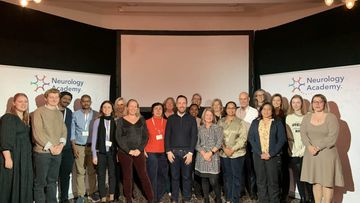Focus on the workstreams: Wellness and lifestyle
How to incorporate wellness and lifestyle interventions into clinical practice
 Dr Agne Straukiene, consultant neurologist at Torbay and South Devon NHS Foundation Trust, is a representative on the national ‘Raising the bar’ steering group and the lead for this workstream.
Dr Agne Straukiene, consultant neurologist at Torbay and South Devon NHS Foundation Trust, is a representative on the national ‘Raising the bar’ steering group and the lead for this workstream.‘I want my patients to live a long, healthy and present life. That’s why I’m so passionate about taking proactive measures to support a healthy brain before alarming symptoms like disability and memory-loss occur in MS.There are multiple modifiable risk factors that influence the likelihood of MS disease progression. This means I have to empower and shape the health they want to have as they age. Together we just need to put a little effort into the present.’
Objectives:
- To review the evidence that wellness and lifestyle interventions improve MS outcomes
- To define measurable outcomes in this area.
Why this workstream?
Wellness and lifestyle interventions are gaining increasing evidence bases for a multitude of long term conditions, as the links between poor lifestyle choices and development of long term conditions also increase.Agne also notes the clear link between an informed and proactive individual, their likelihood of making healthy choices, and the impact both of these things have on their condition.‘From real life evidence and my own observations I’ve noticed that people who are well informed and fully in charge of their condition live a much healthier life. They are more positive, energetic and also resilient to the events and symptoms of the disease.’From the variety of lifestyle risk factors such as smoking, obesity, sedentarism and depression that are now accepted as increasing the likelihood of dementia (Lancet 2017) to the mounting evidence that increasing movement and changes in dietary choices can revolutionise the way people experience their conditions (Move4Parkinson’s, theNeuroStudio) there is now a wealth of evidence in favour of lifestyle interventions as a viable means of prevention, or even treatment.Additional evidence highlights the benefits of wellness strategies such as mindfulness and meditation with clinical trials showing that mindfulness can reduce chronic pain by 57% and research into neuroplasticity suggesting that movement of all kinds can trigger healing in the brain.Evidence of this kind has turned into proactive programmes such as HOPE which Agne notes can add value to the MS community. Based on scientific research from the disciplines of positive psychology, cognitive behavioral therapy (CBT) and mindfulness, its programmes run at 97 locations across the UK, helping to improve positive mental wellbeing, confidence, gratitude and hope whilst also reducing depression and anxiety.
What to expect?
This workstream will be examining the wealth of evidence, such as that touched upon above, that relate to MS.Outlining relevant proven interventions and setting these to measurable outcomes, the outputs of this workstream will aim to equip the MS community with evidence-based, non-pharmacological interventions that can improve the lived experience of those with MS, and contribute to this massing evidence-base to support long-term wellness in the future.Agne summaries the vision for this workstream as ‘integrating the modern diagnostic tools and disease modifying treatments with other modalities such as diet, physical activity, cognitive training, social activities, yoga, meditation, mindfulness and intensive monitoring of metabolic and vascular risk factors.I believe this approach has a positive effect not on just health but also interpersonal relationships.’To do this, will require new ways of working, more self-monitoring tools for patients, a holistic view of the patient and an integrative practice which puts value on the patient-practitioner relationship. ‘There are so many resources that can be joined together with our approach of healthy living and prevention’, notes Agne. This workstream will look to find them, and bring them together in an evidence-based, outcomes-measurable way.
‘Healthcare is undergoing drastic changes in the 21st century. In a few years’ time we will look back and ask ourselves how we could have been practicing medicine so primitively. I believe those practitioners who embrace the Functional and Integrative Medicine paradigms will be at the forefront of healthcare.’
More information:
- Read an interview with Agne as she sets out her vision for this workstream in more detail, outlines her motivations and shares the evidence behind them. Feel her tangible enthusiasm for this work and get involved!
- Read our Spotlight article summing up all of the discussions held at ‘the Way Forward’ event last year.
- Read about the National MS Society’s project in America to establish a wellness research working group to identify associated research priorities.
- To hear from those who have been involved in the HOPE programme watch this short video.
- Listen to Agne talk about mindfulness and MS:
Related articles
Encouraging excellence, developing leaders, inspiring change
MS Academy was established five years ago and in that time has accomplished a huge amount. The six different levels of specialist MS training are dedicated to case-based learning and practical application of cutting edge research. Home to national programme Raising the Bar and the fantastic workstream content it is producing, this is an exciting Academy to belong to.


